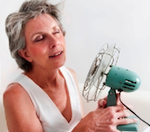Many women have a difficult time with menopausal symptoms. Although a traditional approach to treating hot flashing and night sweating with hormone therapies is effective, it has been know for many years that antidepressant medications, known as SSRI’s, have also been found to treat hot flashes and night sweating in many post-menopausal women.
How is this possible? Hot flashing is a hormonal imbalance … right!
Well this statement is partly true, but in actual fact hot flashing and night sweating are a sign of poor stress tolerance in the women that suffer from them. Since certain antidepressant medications seem to blunt the stress response, this allows women not to get so stressed and can help to control these hormonal deficient symptoms.
But what about treating the underlying cause of the hormonal imbalance …. stress.
This can be a little tricky, as stress can come from many different places but one of the most important things to consider in controlling stress is … if we cannot change our environment or the people in it, what can we do to change ourselves or our response to that environment? When we ask ourselves this questions, options become a lot more clear.
Some of the most important things to consider are controlling your blood sugar, by avoiding refined sugars, grains and tropical fruits, but also implementing some stress reduction strategies, like gentle exercise and deep breathing or meditation practices!
The following article gives women that are experiencing these annoying symptoms some techniques and suggestions to help reduce hot flashing and night sweats. Enjoy!
Alternative methods of relieving hot flashes
Original article posted on Friday, December 07, 2012 by Raw Michelle
Learn more: http://www.naturalnews.com/038246_hot_flashes_natural_remedies_relaxation.html#ixzz2ENY48rBB
Seven out of ten menopausal women have experienced hot flashes and night sweats, with one in ten cases showing symptoms that persist for many years. It is believed that the condition is caused by fluctuations in hormone levels and changes in the body’s temperature regulation mechanisms. A new study coming from Sweden shows that through the right relaxation techniques, women can significantly reduce the incidence and intensity of hot flashes. Moreover, specific foods can bolster these effects, and help women achieve sustainable mental clarity and inner balance.
Applied relaxation is one of the most successful treatments for hot flashes
The technique of applied relaxation was invented by psychologist Lars-Goran Ost and has already demonstrated impressive results in the treatment of anxiety and panic disorder. It consists of gradually relaxing different muscle groups in the body, starting with the hands, face and shoulders, and finishing with the chest, stomach, hips and feet. Swedish researchers studied the effects of applied relaxation, on a group of menopausal women, over the course of five years.
“The participants were given exercises to practice daily at home. The goal was for them to learn to use the method on their own and to be able to manage their own symptoms”, said study lead Elizabeth Nedstrand. The women kept track of their progress, but also provided additional information on subtle changes to their quality of life. After the applied relaxation therapy ended, the women reported a 50 percent decrease in hot flashes, as well as significant improvements in “quality of life,” including better mental focus and better sleep.
Relaxing foods that work against hot flashes
Black Cohosh, a herb historically used by Native Americans to cure a range of ailments, from sore throats to depression, can also help relieve premenstrual syndrome and symptoms associated with menopause. Herbal teas, like mint and camomile, will boost this effect, and help relax both the body and the mind.
Stress and anxiety can sometimes be caused by specific nutritional deficiencies. Nuts and shiitake mushrooms are rich in selenium, a mineral that when lacking, has been linked to elevated stress levels. Cacao, spirulina and sesame seeds contain high amounts of tryptophan, an essential amino acid that possesses significant anti-depressive properties. Tryptophan is also needed to build serotonin, which has been dubbed the “happiness hormone,” due to its importance in shaping our moods.
Leafy greens and cruciferous vegetables (broccoli, cauliflower, cabbage, watercress) are rich in minerals, particularly magnesium and potassium, but also immunity strengthening carotenoids. Low levels of magnesium and potassium are medically linked to major depression and an increased risk of stroke. Kiwifruit, bell peppers and oranges are rich in vitamin C, an indispensable nutrient with a range of biological effects, including important roles in supporting brain health.
Sources for this article include:
http://www.sciencedaily.com/releases/2012/11/121122112835.htm
http://theconsciouslife.com
http://www.cb1.com/~john/misc/relax.html
